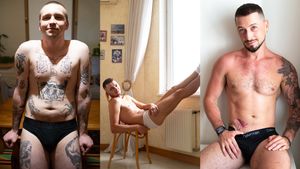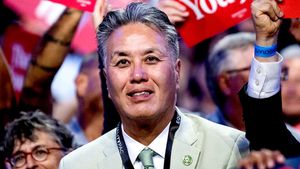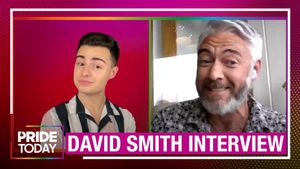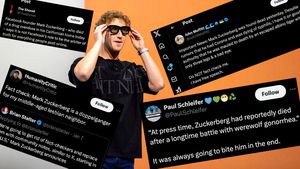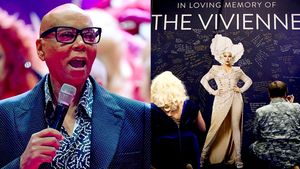
Treatment GuideJust DiagnosedSex & DatingAfrican AmericanStigmaAsk the HIV DocPrEP En EspañolNewsVoicesPrint IssueVideoOut 100
CONTACTCAREER OPPORTUNITIESADVERTISE WITH USPRIVACY POLICYPRIVACY PREFERENCESTERMS OF USELEGAL NOTICE
© 2025 Pride Publishing Inc.
All Rights reserved
All Rights reserved
By continuing to use our site, you agree to our Private Policy and Terms of Use.
Tom Donohue is ordinary. He is a face in the crowd. He is just like everyone else. Talk with the now-26-year-old man for an hour or so and you will hear him make this claim to conventionality some nine or 10 times. It is his mantra. But because he is an HIV-positive youth, it is also his public-health message. Whether this message is powerful enough to reach today's young people raises the thorny question of just what it takes to get a new generation invested in wanting to protect themselves against HIV'or in some cases, what it takes to make them remember the virus exists at all. When the rural Pennsylvania resident and off-and-on college student found out he was HIV-positive in October 2003, his reaction to the news was unusual for someone his age: After about six weeks he started a new life of public speaking about his serostatus. He now runs a fledgling nonprofit organization, Who's Positive, along with its Web site, WhosPositive.com. And there is a billboard along U.S. Route 220 near Lock Haven, Pa., emblazoned with his unassuming face and the words 'My name is Tom'25 years old'HIV-positive'and in your neighborhood. Just like HIV. Have you been tested lately?' Donohue's routine is to show up in a room of college students as they file in and sit among them as if he were one of their peers. A facilitator will announce that someone in the room is HIV-positive, at which point Donohue will jump up and announce in his cheerful style that he is the man in question, thus stressing that HIV could strike any one of them. Over the course of 40 minutes he then tells unscripted stories about his experience. A Q&A session follows. His program is almost entirely social in its approach, with few statistics and little talk of the nitty-gritty of safer-sex techniques. He readily admits that he is 'no expert on HIV,' although he does heavily stress the importance of safer sex and getting tested. Rather, Donohue focuses largely on tapping into young people's fears of having to tell others that they are HIV-positive'ironic, since he has clearly conquered his fear of disclosing his infection by doing so to as many people as possible. Shattering Preconceptions There is further irony in the duality of Donohue's averageness. This John Doe identity serves as a symbol of what led to his infection, and it now is the focus of his prevention message. His everyman mind-set made him believe that HIV would never strike a guy like him, since he lived so far from big cities. Though he had had unprotected anal sex with casual partners, he had no reason to believe his HIV antibody test would come back positive, because he had a vague notion about HIV of gruesome purple Kaposi's sarcoma lesions. When asked what kind of sex education he had in school, he says he cannot recall any. Clearly, whatever was taught did not make an impression. When he is speaking to students, he does not reveal too much personal information. He does not even tell them he is gay, instead simply referring to his former boyfriend as his 'partner,' and he tends not to address the loneliness or isolation he feels. This rhetorical sparseness allows students to use him as a template in their psyches: They put themselves in his place and report coming away with a renewed sense that HIV is no picnic. In truth, Donohue represents a somewhat chilling personification of the ordinary. He is a prototypical example of the failure to get the message to today's youths in time to protect them against HIV. Sex Education Failings According to the CDC, half of all new infections'about 20,000 cases each year'occur in Americans 24 or younger. And a recent study conducted by the Alan Guttmacher Institute found that about 32% of teenage boys do not receive HIV prevention education before the first time they have intercourse, which on average is at 17 for both boys and girls. This year the federal government will spend $167 million on abstinence-only sex education in public schools, more than double what was spent in 2001. A report commissioned by Democratic U.S. representative Henry A. Waxman found that in one of the major national abstinence programs, over 80% of the curricula contained false, misleading, or distorted information. Numerous studies have shown that not only is abstinence-only sex ed ineffective, but its insistence that contraceptives are not to be trusted can lead to riskier sex practices in the long run. On the other hand, scientists widely praise comprehensive sex education'which addresses abstinence as one option in a broader spectrum of sexual choices. Evidence shows this technique delays the onset of sex, increases contraceptive use, and reduces the number of sex partners. Still, according to Guttmacher findings, 35% of U.S. schools offer abstinence-only sex ed, and an additional 51% teach that abstinence is preferred but allow that contraceptives are effective. Only 14% teach comprehensive sex ed. Undoing the damage of imperfect or nonexistent sex ed, along with reminding students that they are at risk, is the task of countless foot soldiers'from those dispatched to college campuses by large organizations (like Planned Parenthood or the National Association of People With AIDS) to solo workers like Donohue. These educators say they have to walk a fine line between encouraging safer sex and fostering unhealthy anxiety about physical intimacy. Fear Factors On the whole, AIDS activists agree that peer education is the most effective tool for reaching youths, since students like to receive health information from someone they can relate to. But Michael McGee, vice president of social marketing at Planned Parenthood, questions Donohue's method of presenting himself as a peer to teens while shying away from the educator role. McGee says such programs can cause excessive anxiety in students by leaving them with a heightened fear of HIV but without enough information on how to keep themselves negative'other than the common 'be safe' and 'get tested' directives. Laura Pinsky runs Columbia University's HIV testing and counseling site, which was the world's first campus organization of its kind when she founded it in 1985. Pinsky says most Columbia students would not bother showing up at an HIV-related event because the issue simply is not pressing enough. So her organization's stance is that education about safer sex requires a deeply psychological, one-on-one approach. The student counselors may spend up to 40 minutes with their clients, discussing not just safer sex but all aspects of human sexuality. Amanda Crosier, who coordinates the program, says that 'there's not a very realistic understanding of HIV' in the students she counsels. 'There are people who are really freaked out about it needlessly.' The testing site's most prevalent demographic is the heterosexual women who have few risk factors for infection'yet they are often plagued by anxiety just the same. On the other hand, Crosier says, young gay men often have the opposite problem. They tend not to have HIV on their radar screens in a meaningful way and are not afraid enough to protect themselves properly. 'The challenge now, from my perspective, is to get my clients not to be afraid of sex'to have a healthy fear of HIV, certainly'but to somehow find the middle ground where they are able to make good decisions,' Crosier says. Donohue disagrees, preferring a more casual approach than one that replicates seeing a psychologist. 'Once we talk abstinence, once we talk statistics, the program becomes not as effective as if we were just peer-to-peer,' he says. 'Once you cross that peer-to-educator line, you start to lose people's attention.'
From our Sponsors
Most Popular
Why activist Raif Derrazi thinks his HIV diagnosis is a gift
September 17 2024 12:00 PM
How fitness coach Tyriek Taylor reclaims his power from HIV with self-commitment
September 19 2024 12:00 PM
Out100 Honoree Tony Valenzuela thanks queer and trans communities for support in his HIV journey
September 18 2024 12:00 PM
Creator and host Karl Schmid fights HIV stigma with knowledge
September 12 2024 12:03 PM
The freedom of disclosure: David Anzuelo's journey through HIV, art, and advocacy
August 02 2024 12:21 PM
From ‘The Real World’ to real life: How Danny Roberts thrives with HIV
July 31 2024 5:23 PM
Eureka is taking a break from competing on 'Drag Race' following 'CVTW' elimination
August 20 2024 12:21 PM
California confirms first case of even more deadly mpox strain
November 18 2024 3:02 PM
Plus: Featured Video
Latest Stories
A camp for HIV-positive kids is for sale. Here's why its founder is celebrating
January 02 2025 12:21 PM
This long-term HIV survivor says testosterone therapy helped save his life.
December 16 2024 8:00 PM
'RuPaul's Drag Race' star Trinity K Bonet quietly comes out trans
December 15 2024 6:27 PM
Ricky Martin delivers showstopping performance for 2024 World AIDS Day
December 05 2024 12:08 PM
AIDS Memorial Quilt displayed at White House for the first time
December 02 2024 1:21 PM
Decades of progress, uniting to fight HIV/AIDS
December 01 2024 12:30 PM
Hollywood must do better on HIV representation
December 01 2024 9:00 AM
Climate change is disrupting access to HIV treatment
November 25 2024 11:05 AM
Post-election blues? Some advice from mental health experts
November 08 2024 12:36 PM
Check out our 2024 year-end issue!
October 28 2024 2:08 PM
Meet our Health Hero of the Year, Armonté Butler
October 21 2024 12:53 PM
AIDS/LifeCycle is ending after more than 30 years
October 17 2024 12:40 PM
Twice-yearly injectable lenacapavir, an HIV-prevention drug, reduces risk by 96%
October 15 2024 5:03 PM
Kentucky bans conversion therapy for youth as Gov. Andy Beshear signs 'monumental' order
September 18 2024 11:13 AM
Study finds use of puberty blockers safe and reversible, countering anti-trans accusations
September 11 2024 1:11 PM
Latinx health tips / Consejos de salud para latinos (in English & en espanol)
September 10 2024 4:29 PM
The Trevor Project receives $5M grant to support LGBTQ+ youth mental health in rural Midwest (exclusive)
September 03 2024 9:30 AM
Introducing 'Health PLUS Wellness': The Latinx Issue!
August 30 2024 3:06 PM
La ciencia detrás de U=U ha estado liberando a las personas con VIH durante años
August 23 2024 2:48 PM




































